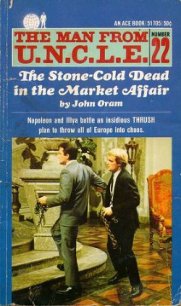The Copenhagen Affair - Oram John (читать книги онлайн бесплатно полностью без txt) 📗
“Did you get the others?”
“One. A small man. A petty crime type, I think.”
That would be Per, thought Solo. Unlucky to the last. He said, “All right. We’ll come.”
At the foot of the stairs handlamps made a pool of light in which a couple of Danes were working on a third man. Hallway down Solo knew it was Charles.,
His ugly face was white and glistening with sweat but he managed a grin when he saw Solo.
“’Ullo, ’Oudini,” he wheezed. “I wouldn’…be in your shoes…w’en the Boss gets…’old of you.”
Solo knelt down. His hand closed over Charles’ gnarled paw. He said gently, “Who are you?”
Charles said painfully, “Sorry, guv’nor. Did me best…’E must’ve rumbled me…”
“Garbridge?”
“Yes.” With an effort he managed to half-raise his bead. “Don’t blame yerself. Fightin’ out o’ yer clarss.”
His eyes closed. One of the Danes moistened a swab and passed it over the dry lips.
Charles tried again. “You there…guv’?”
“I’m here.”
“Tell my mob…M.l.7…An’ ’Oudini…” The lips writhed back gamely from yellow broken teeth. “…You ’ad me all wrong…”
“I’ll see to it,” Solo promised. But Charles no longer cared.
After a few hours sleep and a shower Solo showed up at the Paramount Products office in the Gammel Strand. He was wearing a decent suit and fresh linen but there was nothing he could do about his face.
The blonde was still at the switchboard. She said, “Why, Mr. Solo! Did you run into a lamp post?”
“Sweetie pie,” he said, “there are times when your humor is scintillating. This isn’t one of them. Tell your boss I’m here.”
She straightened as if he had slapped her face. Her big eyes got hard. She said, “Go in, please. Mr. Jorgensen is waiting.”
There were three of them in the room: Mr. Jorgensen, Illya and Karen. Karen was wearing her student rig, the shabby black sweater and pants and a faded blue anorak.
Mr. Jorgensen wasted no time in preliminaries. He said, “Gfort Gerning staar ikke tel at aendre. As you say, ‘it is useless to cry for the spilled milk.’ Garbridge has disappeared. Some who might have been useful are dead. Now we must see what we have and what we may do next.”
‘Well, at least we know where they were going,” Solo said. “Before you came along and broke up the party they were all set to take off by helicopter for a place called Harsens—if that means anything to you.”
“Harsens,” said Mr. Jorgensen didactically, “is an industrial town of some thirty-eight thousand people on the east coast of Jutland. There is a factory which makes bicycles and another which makes TV sets, radios and tape recorders. There is also a large meat cooperative. I cannot see why Garbridge should wish to go there.”
“I don’t know,” Solo said. “It’s the kind of place Thrush might pick for one of its satraps. The radio and electronic tie-up is interesting.”
“But how could they make flying saucers in such a town?” Karen objected. “This would need a huge factory, and everybody would know of it—and talk.” She smiled. “Danes cannot help talking.”
Illya said, “The factory is not in a town. The films Norah Bland brought back make that very clear. All the activity is in wooded, hilly countryside. But here’s the strange thing. Some of the shots show workmen in overalls, and armed guards—but there’s not a building, not so much as a sizeable house, in sight.”
Karen laughed. “Do you suggest they make the things in the open air—or burrow in the ground like rabbits?”
A sudden bell rang in Solo’s brain.
“By God! I believe you’ve hit it,” he said. “Just before the balloon went up Garbridge was trying to make a radio contact. He was calling, ‘Come in, Hades. Come in, Hades.’”
Jorgensen repeated, “Hades. The underworld. Of course—an underground factory, like those the Germans used during the war. This makes sense indeed.”
“Did they have such factories here in Denmark during the Occupation?”
“They did, though I have not heard of any in Jutland.”
Illya said quietly, “But Garbridge was a collaborateur, no? I think we must go to Horsens.”
Not far from the Paramount Products building there was a bar that looked as if it had been there for a hundred years. Solo went in, slumped on a chair and ordered a Carlsberg.
With no other customers in sight the barman was disposed to be chatty, but Solo was in no mood for badinage. He was terse and the man went back to polishing the counter with an offended air.
Solo was halfway through his second beer when Gutte came in. She was wearing a heavy red coat with a cheap fur collar. A scarf was tied peasant-fashion over her blonde curls. She took the seat next to Solo, ordered a Tuborg and fumbled in her bag for cigarettes.
Solo passed her his pack of Queens and put three kroner on the table for the beer.
She threw him a coy look over the top of the glass.
She said, “Why, Mr. Solo! This is generosity.”
Solo grunted, “Cut out the comedy. You’re a big girl now.”
She took a long drink, put the glass down, rummaged in her bag again for a lighter. She lit her cigarette, dragged the smoke deep into her lungs, exhaled it through her nostrils in two thin streams. All the time she stared straight ahead.
When she spoke again her tone had changed. She said gently, “Want to talk about it, Napoleon?”
“No, thanks. I’m in no mood for humor. Have another beer.”
“I’m not laughing.” She swung around in the chair to face him. Her hand came to rest on his. It felt friendly.
She said, “Look, brother. I’ve been in this business probably longer than you have—a darned sight longer than I care to think about. You think I like doing purl and plain on that damned switchboard? Look!”
She pushed the blonde curls back over her scarf. Her forehead was seared by deep ragged scars, crisscrossed like railroad tracks. She let the hair drop back, slowly peeled off the thin gloves that she wore even in the office and held out her hands. They were charred, fleshless claws.
“Souvenirs of Thrush,” she said. “That’s when I lost my girlish laughter.”
While Solo was trying to control the sickness in his stomach she slid off the chair and patted her hair into place. “Let’s get out of here before I start crying into my beer. I want to talk to you.”
They walked down to the waterfront and stood looking out over Inderhavn, leaden in the winter sunlight. A big freighter was moving upstream, her black sides streaked with rust. Some of the crew were clustered in the stem, getting their first view of the home port maybe for months. A kid in a thick sweater and white gob cap waved to Gutte. She waved back and the boys whistled on two descending notes. One cupped his hands and shouted something. All they caught was “toni…ight”. But they could guess the rest.
Gutte said, “I know everything that went on this morning—and last night. It’s part of my job to monitor and tape all discussions in the inner office. Napoleon, you must find that factory.”
He grinned. “That’ll be an easy job. If we only knew where to start looking.”
She said, “I do not think you will find the answer in Horsens. That’s what I wanted to tell you. I think you should go to Aarhus. There’s a man there—an old Resistance fighter.” She took an envelope out of her coat pocket. Here are his name and address. Go and see him. If the Germans had underground factories in Jutland he would have known about them.”
Solo said, “Why tell me? Why haven’t you put it up to Jorgensen?”
She shrugged. Mr. Jorgensen does not take advice gladly. Besides…when I got these”—she touched her scarred forehead—“I was with just such another traeklods—chump—as you. He didn’t get back…”
She turned abruptly and headed fast along the Havnegade.



![[Magazine 1966-12] - The Goliath Affair - Jakes John (чтение книг TXT) 📗](/uploads/posts/books/56867/56867.jpg)
